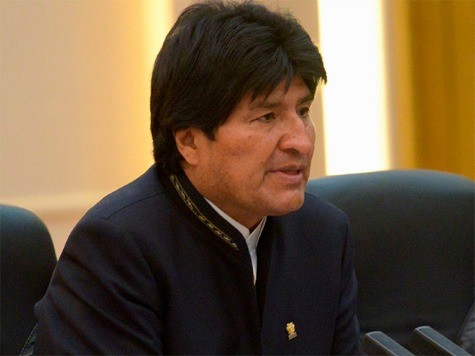
Bolivian President Evo Morales says his nation is ready for nuclear development. In his speech to the nation on New Year’s Day, Morales decried those who argue that peaceful nuclear energy use is “only for developed nations” and announced his country was “not far” from having nuclear power.
“We are not far–a little while from here, we will be about to count on atomic energy for pacific means, because we have enough prime material,” Morales said in his speech yesterday. While it is not yet clear what he means by prime material, it is known that Bolivia has natural uranium deposits, though there are no official records of how much of that uranium is in the hands of the government and how much of it is enriched. Bolivia had previously announced it was working with Argentina and other nations on the nuclear question, however, though that announcement was also vague.
Morales’ message that his country could “continue to dream” but was not a “warrior nation” and deserved a shot at developing nuclear energy was not all positive and peaceful. He took a swipe at the United States and derided those who believe “only developed countries should be able to count [on nuclear energy].” He added that Bolivia “has a right to defend itself constitutionally” despite being a peaceful nation, though he did not imply that the development of nuclear power had to do with weapons. During his announcement of the nation’s pursuit of nuclear power last October, Morales touched on similar themes, objecting that some NGOs “oppose everything. They will not let us work, they will not let us explore, they will not let us industrialize, not even to develop hydroelectric plants.”
Morales’ Bolivia has long been a controversial place–an ally of Venezuela and Ecuador and a stalwart against the United States. 2013 was an especially strained year for relations between the United States and Bolivia. Morales somehow involved himself in the extensive Edward Snowden saga to the extent that American intelligence believed Snowden might have been on Morales’ plane out of Europe and commanded it down. (Snowden was possibly in Moscow by then.) This was also the year John Kerry’s diplomacy resulted in Morales’ kicking USAID out of Bolivia completely. The Snowden incident also resulted in Morales’ threatening to close the US embassy in La Paz.
While Bolivia’s nuclear aspirations have not caused any significant international alarm yet–perhaps because of their geographic location or the lack of evidence that there is more to their nuclear program than talk–Bolivia’s proximity to Venezuela is cause for concern. It provides about as much concern as Bolivia’s quest for nuclear power should provide Venezuela. A nuclear Bolivia would buy significantly smaller amounts of oil from a shockingly impoverished Venezuela, an OPEC country that can’t seem to keep a steady toilet paper supply, thanks to a Marxist economy.
While there are no signs of tension between Morales and the new Venezuelan regime after Hugo Chávez’s death, Morales and Maduro certainly do not appear as close as the Bolivian premier did with his predecessor. Giving Bolivia a reason to depend less on Venezuela’s oil cannot possibly do much to sweeten that relationship.
Venezuela has expressed interest in nuclear energy, too, but that country’s two bigger allies–Russia and Iran–make the possibility of enriching uranium even more dangerous. Long before this week’s announcement, Bolivia had been rumored to be in talks with Iran to provide uranium that they have proven able to enrich. Chávez-era Venezuela was involved in this scheme as well, but no new information has surfaced tying the Nicolás Maduro administration to any uranium sales between Bolivia and Iran.
Bolivia announced it has plans to update the UN and greater world on its nuclear development over the next few months and years, aiming for full nuclear development by 2025, that nation’s bicentennial anniversary.

COMMENTS
Please let us know if you're having issues with commenting.